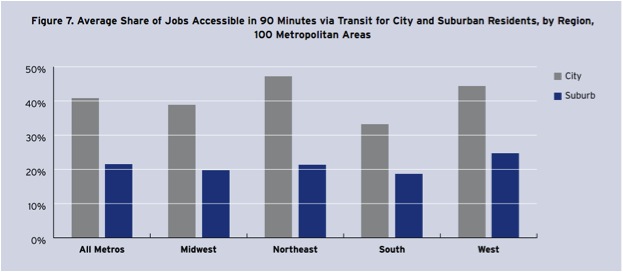What does the Brookings Institute’s Study on Transit & Jobs Really Tell Us?
On May 12, 2011, the Brookings Institute released a first-of-its-kind study that looked at job accessibility in metropolitan areas via transit. This exhaustive study took on the issue of job sprawl – the decentralization of jobs from the traditional downtown or urban core and out into the suburbs – and found that Western US cities’ transit systems, such as Los Angeles and Honolulu, have better job accessibility than their compact East Coast counterparts. The reason is because Western cities’ transit systems were designed post-automobile. That is to say, Western transit systems were designed to connect suburbs to central cities.
In summary, the Brookings study made the following conclusions:
- Nearly 70% of large metropolitan residents live in neighborhoods with access to transit service of some kind. This includes bus and light rail.
- In neighborhoods covered by transit, morning rush hour service occurs about once every 10 minutes for the typical metropolitan commuter.
- The typical metropolitan resident can reach about 30% of jobs in their metropolitan area via transit in 90 minutes.
- About one-quarter of jobs in low- and middle-skill industries are accessible via transit within 90 minutes for the typical metropolitan commuter, compared to one-third of jobs in high-skill industries.
- Fifteen of the 20 metro areas that rank highest on a combined score of transit coverage and job access are in the Western US and 15 of the 20 metro areas that rank lowest are in the Southern US.
Download the Study Here!
The Brookings study did not do one thing that has some critics crying foul. The study did not look at performance as a function of ridership. Because the study ignored ridership, instead to focus on job accessibility, does that make the study flawed? Are its conclusions and ranking of transit systems somehow incorrect because of it? Some say yes. I say no.



